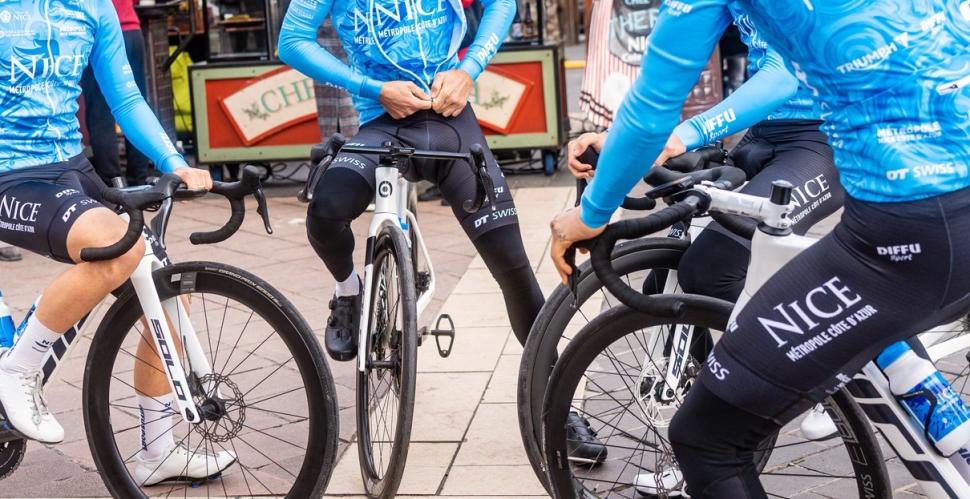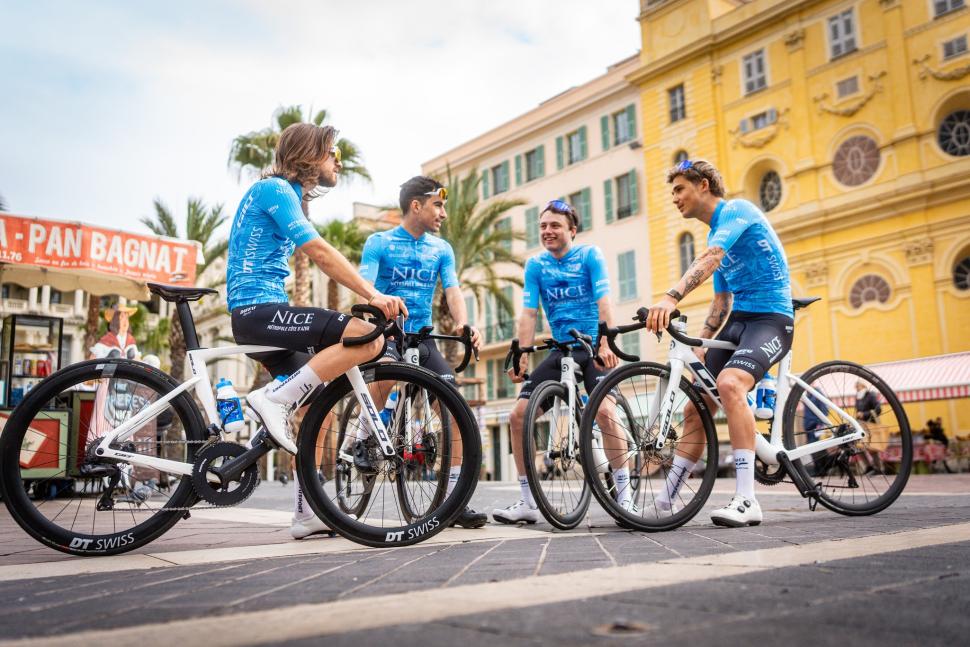- News
- Reviews
- Bikes
- Components
- Bar tape & grips
- Bottom brackets
- Brake & gear cables
- Brake & STI levers
- Brake pads & spares
- Brakes
- Cassettes & freewheels
- Chains
- Chainsets & chainrings
- Derailleurs - front
- Derailleurs - rear
- Forks
- Gear levers & shifters
- Groupsets
- Handlebars & extensions
- Headsets
- Hubs
- Inner tubes
- Pedals
- Quick releases & skewers
- Saddles
- Seatposts
- Stems
- Wheels
- Tyres
- Tubeless valves
- Accessories
- Accessories - misc
- Computer mounts
- Bags
- Bar ends
- Bike bags & cases
- Bottle cages
- Bottles
- Cameras
- Car racks
- Child seats
- Computers
- Glasses
- GPS units
- Helmets
- Lights - front
- Lights - rear
- Lights - sets
- Locks
- Mirrors
- Mudguards
- Racks
- Pumps & CO2 inflators
- Puncture kits
- Reflectives
- Smart watches
- Stands and racks
- Trailers
- Clothing
- Health, fitness and nutrition
- Tools and workshop
- Miscellaneous
- Buyers Guides
- Features
- Forum
- Recommends
- Podcast
TECH NEWS
 Ekoi PW8 pedal team nice metropole2
Ekoi PW8 pedal team nice metropole2UCI orders pro team to stop using Ekoi's radical new road pedals an hour before race start
Ekoi's prototype road pedals have been the talk of the town recently. The wide-platform pedal design, dubbed 'PW8', grabbed attention last week after it was revealed – unintentionally, perhaps – that UCI Continental teams Nice Métropole and Burgos had adopted them. However, a recent development has put a temporary halt to their usage.
According to a report from French cycling website Matos Vélo, UCI officials at the Etoile de Bessèges stage race told the Nice Métropole Côte d’Azur team to switch to alternative pedals right before the second stage last weekend – though the pedals had allegedly already been used in Marseille the week before.
It was reported that the ban was imposed due to an administrative oversight – suggesting that an application for the use of a prototype had been submitted, but it had not been approved before the race.
We contacted Ekoi for a comment, and the brand claimed: "This is just an admin issue, UCI doesn't have any problem with us."
Though the details are not scarce, from the UCI rulebook it can be confirmed that prototype equipment is eligible for use at races, as long as it's been registered with the governing body. This means that it is unlikely the design of the pedal was the issue, rather documents had perhaps not been submitted and approved in time, as has been suggested.
Matos Vélo had a reporter on-site at the race, who witnessed the unfolding drama. Just an hour to go before the race started, UCI commissioners reportedly prohibited the Nice Métropole team from using the PW8 pedals. This unexpected move threw the team into a frenzy, as they scrambled to find replacement pedals and compatible shoes.
While securing pedals didn't seem much of an issue, the specific shoe interface required by the PW8 pedals posed a greater challenge. Riders were seen borrowing shoes from rival teammates and even resorting to purchasing them from nearby market stalls, creating quite a spectacle.
Ekoi has said it cannot share any more information on the pedals that have allegedly garnered interest from teams like UAE Team Emirates and Team Ineos Grenadiers – so we'll just need to wait for their official launch and see if they make a return to the peloton.
As for the performance of the Nice Métropole Côte d’Azur team, despite the pedal debacle, seven riders managed to complete the race, with Andrea Mifsud leading the charge and finishing in 31st place.
Latest Comments
- Velo-drone 9 sec ago
Thoughts from a regular church-goer and cyclist:...
- Pub bike 15 min 14 sec ago
And in other news Putin says that one day history will show that it was Ukraine that invaded Russia.
- pockstone 27 min 5 sec ago
Indeed, and in my defence I do think two missing apostrophes and a misspelling are far outweighed by that increasingly prevalent mangling of...
- mark1a 39 min 30 sec ago
I'm just someone on the internet with an opinion like everyone else here!...
- Secret_squirrel 56 min 20 sec ago
Why has such a fugly and massive rear light got such poor run times? My tiny Flare RT has 12hrs at 45 lmns.
- GMBasix 1 hour 23 min ago
Bronze = lasts longer than a cable tie
- Secret_squirrel 1 hour 32 min ago
You're missing the point. The cassette is unforgiveable when aimed at this market and the width of the tyres not much better. You shouldnt have...
- Secret_squirrel 2 hours 13 min ago
Its tragic but worth noting that this is just statistics playing out. Same happens at most mass participation sports events. The London Marathon...
- Hirsute 4 hours 16 min ago
I'd find a physio who would have a look. They will do tests to determine where the issue lies, the extent of mobility and maybe some exercises....
- Miller 4 hours 22 min ago
An uh-oh email signifying that it took Tadej Pogacar to dethrone you, that's pretty impressive. You'd want to keep that email.

Add new comment
12 comments
Too cumbersome. There should be a few races where bikes can use whatever as long as it conforms to dimensional and function regulations
When every team has this 8 watt improvement, what next?
That's just 8 watts from one thing, you add in all the watts that they advertise you can get from doing everything from clothes to the bike, to the stuff on the bike, and the figure comes out to around 75 to 100 watts depending on what your reading, so the average bike speed at the Tour de France should be significantly more than what it is, really the average speed has only gone up by 3.5 mph since 1963, but the race has been shortened over the years by around 500 miles, so the real gain in speed is from the fact that the race is not as tiring on the riders as it once was, so where's all the speed from the all the watts they blab about that person could save? THERE ISN'T ANY, it's pure marketing hype, or should I say BS.
They would have been riding on gravel roads for chunks of the tour too back in 1963. Lot of the mountain passes were still dirt roads then.
With all the watts these cyclists are said to be saving today, it's a wonder they don't rocket off at lightspeed, while /imparting/ magic energy on the universe.
There are a huge number of additional factors to consider though, the most obvious one being that virtually every rider in 1963 would have been doping ferociously (no testing of any sort until 1966 ("One does not win the Tour de France on Perrier water" - Jacques Anquetil, 1963 winner)). It should also be noted that although 4.5 km/h (difference between 1963 and 2023) doesn't sound an awful lot it represents a 12% improvement which would see the 1963 winner coming in almost exactly 10 hours down, or a notional 350 km behind, the 2023 champion.
They had stimulants primarily. Stimulants make a difference, but nowhere as great as hormones can do.
Also, Anquitil would have been more than a few hours behind today's winner simply cause the 1963 Tour was 4138 km long - 733 km more than todays. But ridden over the same 3 weeks and 21 stages. That's 34 km extra per stage, average. So 50 to 56 minutes longer per day, at 2023 or 1963 average speed.
The fatigue level would have been a bit higher in 1963. I imagine they spent less time riding in large pelotons then too - the race was less controlled, but I can't find good sources.
Fair points but my ten hours calculation was on the basis of the time Anquetil would have taken to ride the 2023 distance. Although doping obviously became more sophisticated they did use hormones in the early 1960s, which were then actually completely legal to buy and to use.
..
That simply doesn't follow. It's not a time trial, the riders are not aiming to finish the stage in the lowest absolute time, and anyone who did would find his rivals destroying him in the last ten percent of a stage after he'd towed them round the first ninety. For much of a stage the leaders and the peloton are just cruising, waiting for someone to attack - and that's when a few extra watts counts. You could maybe compare times on the big climbs over the decades, but not average speeds over the whole race.
Which is not to say that manufacturers don't exaggerate the watt savings of their latest doohickey.
I want market stalls that sell bike gear.
I do not want that, I can only imagine an equivalent to Alibaba from the pre internet age.
Silly situation that shouldn't have happened.
The fault lays equally between the team (for not checking the paperwork was filled and approved before supplying them on race day) and the race commissaires for not checking they were approved, and allowing them to race last week. Definitely embarassing for all involved.